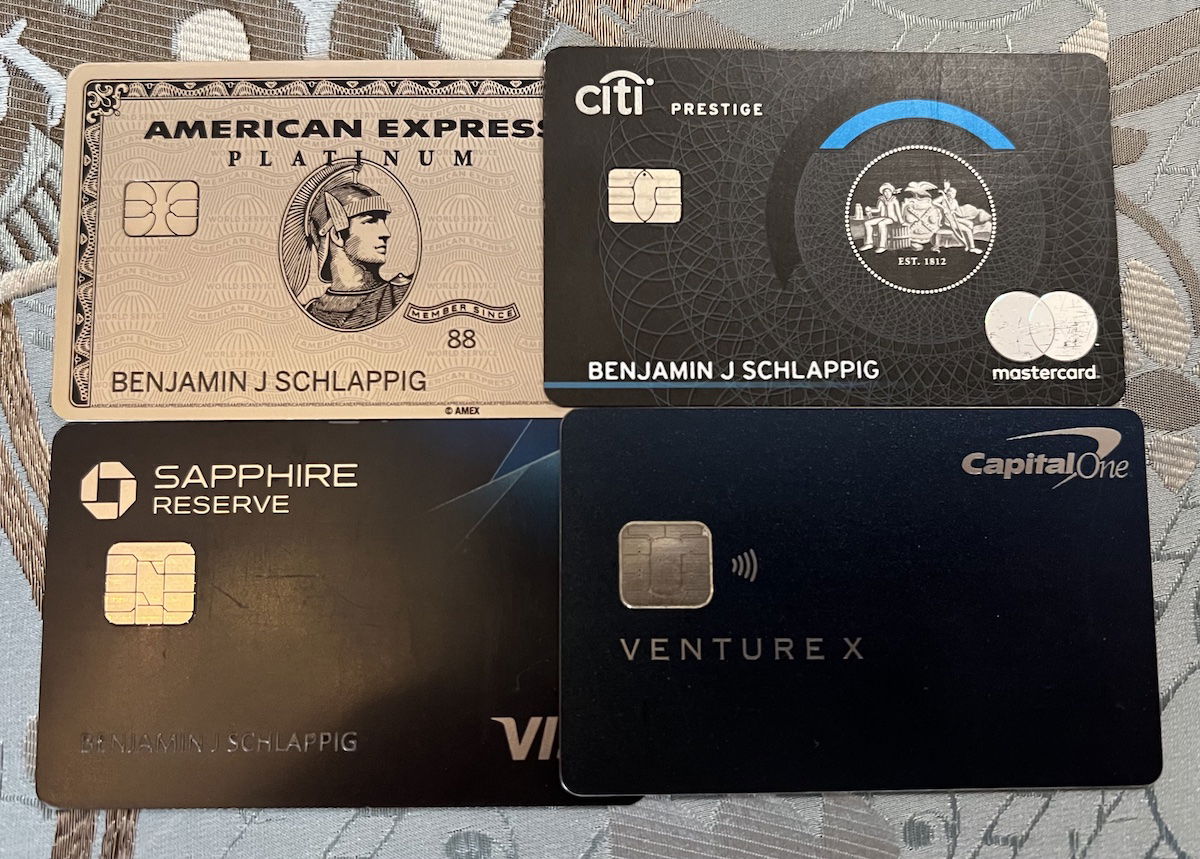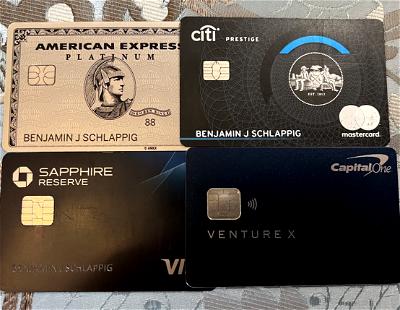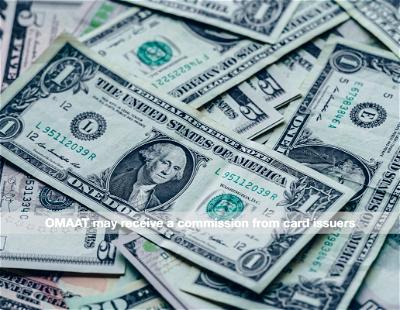Most people probably don’t look forward to paying their taxes. For those of us in the miles & points world, though, one silver lining is the potential to generate credit card spending at an attractive rate.
Personally I pay all of my estimated quarterly and annual taxes by credit card, so in this post I want to take a closer look at why. Long story short, the credit card rewards that you can generate by using a credit card can more than offset the fee of doing so. What’s exciting is that the service fee to pay taxes by credit card has decreased as of 2025, making this an even better opportunity than in the past.
In this post:
How much does it cost to pay taxes by credit card?
You can’t pay your federal taxes directly with the IRS by credit card, but rather there are two services that facilitate this. For the record, this is officially approved by the IRS, so this isn’t some shady operation. Here are the two options, along with their fees for credit card payments:
- Pay1040.com, with a 1.75% credit card fee (the fee is 2.89% for Amex personal cards and all business cards)
- ACI Payments, Inc., with a 1.85% credit card fee
For what it’s worth, there used to be a third processor as well, which was PayUSAtax, but that company is no longer processing tax payments. As of 2025, we’ve seen the service fees for the two remaining options decreased, as they were previously 1.87% and 1.98%, respectively. However, in the case of Pay1040, the cost has increased for Amex cards and business cards.
While the exact types of cards accepted differ somewhat between the services, all of them accept American Express, Mastercard, and Visa payments.
Also note that the above fees are for paying federal income taxes, whether year-end or quarterly. If you’re paying state or local taxes (including property taxes), there may be opportunities to pay by credit card directly online. However, the fees will differ, and the above services can’t be used for that.

What are the logistics of paying taxes by credit card?
Of course everyone is in a different situation when it comes to how much they owe in taxes, and what their credit limits are on cards. Some people with big tax bills might be in a position where what they owe is significantly more than the credit limit on their card. So how does that work?
The IRS officially claims that you’re allowed to make two credit card payments per payment period. However, anecdotally speaking, the limit seems to be two credit card payments per payment processor per tax period. Since there are two services, you can potentially make four payments per payment period by credit card. If you pay quarterly taxes, this means you could potentially make well over a dozen payments per year by credit card.
At least that’s how I (and many others) have been doing it for years without issue. You always provide your social security number when making a payment, and the IRS lets you track payments received based on that. I’ve never had an issue with them not showing up correctly.
There could be a benefit to using a card with no preset spending limit, since these cards will often let you spend more than a traditional card.
When is paying taxes by credit card worth it?
If you’re a savvy credit card user who pays taxes directly to the IRS, then paying your taxes by credit card should be a no-brainer. This is a great opportunity to generate credit card spending at the reasonable cost of just a 1.75% convenience fee.
Before I talk about the exact situations under which this makes sense, let me emphasize a couple of points:
- You shouldn’t pay taxes by credit card if you’re not actually good at maximizing credit card rewards, and if you’re not earning rewards that exceed the cost of the fees; you’ll want at least a calculated return of 2%, and ideally more
- You shouldn’t pay taxes by credit card if you can’t use credit cards responsibly, and are going to end up financing your tax payments using high credit card interest rates
With that in mind, under what circumstances does it make sense to pay your taxes by credit card, while paying a fee of 1.75-1.85%? In no particular order…
Credit cards with a great return on spending
The credit card landscape is incredibly competitive nowadays, and credit card rewards structures have improved considerably. If you’re using one of the best cards for everyday spending, you should easily be able to get value that exceeds the 1.75-1.85% fee.
For example, there are several cards that potentially earn up to 2x transferable points per dollar spent, including the following:
- Capital One Venture X Rewards Credit Card (review)
- Capital One Venture Rewards Credit Card (review)
- Citi Double Cash® Card (review)
- The Blue Business® Plus Credit Card from American Express (review)
- Capital One Venture X Business (review)
- Capital One Spark Miles for Business (review)
I value all these points currencies at 1.7 cents each, meaning that to me that’s the equivalent of a 3.4% return on spending. This is essentially a way to acquire transferable points for under a cent each, which I think most would agree represents a good value. I’d buy transferable points all day long at under one cent each if I could.
Let me also emphasize that above I’m including both personal and business cards that earn 2x transferable points. However, keep in mind that you should typically not use business cards for personal spending. However, I’m trying to be thorough in terms of the return on spending offered by various cards.
As you can see above, you can even come out marginally ahead by using a good cash back card, which earns a 2%+ return on spending. A 2% return on spending probably isn’t worth the hassle factor, but in some cases you can do even better than that.

Meet credit card minimum spending requirements
There are some amazing credit card welcome bonuses out there, which generally require you to spend a certain amount within a defined period. Sometimes the spending requirements might be more than you’d otherwise ordinarily spend, especially if there’s a huge bonus with a significant spending requirement.
Paying taxes at a reasonable fee of 1.75-1.85% is a great way to generate credit card spending for these purposes.
Credit cards with spending or threshold bonuses
In addition to the cards with a generally lucrative return on everyday spending, there are also cards with specific threshold spending bonuses, which are particularly lucrative.
For example, the World of Hyatt Credit Card (review) has a $15,000 annual spending sweet spot, if you ask me. If you put a $15,000 payment on the card for a 1.75% fee (~$263), you’d earn 15,000 World of Hyatt points, a Category 1-4 free night award, and an incremental six World of Hyatt elite nights. That’s a pretty great value.
Similarly, the Hilton Honors American Express Surpass® Card (review) offers a free night award when you spend at least $15,000 on the card in a calendar year. So not only would you earn 45,000 Hilton Honors points for spending $15,000, but you’d also earn a free night award valid at a property costing up to 150,000 Hilton Honors points. That’s incredible.

Credit cards with airline & hotel elite status opportunities
There are more opportunities than ever before to earn airline and hotel loyalty program elite status through credit card spending.
For example, American AAdvantage status is based on earning Loyalty Points, so you can qualify for elite status through credit card spending. Spending $180,000 on the Citi® / AAdvantage® Executive World Elite Mastercard® (review) would earn you American’s top tier Executive Platinum status (you need 200,000 Loyalty Points, and the card offers an annual Loyalty Points bonus of up to 20,000 points).
Now, is this worth earning exclusively through credit card spending? No, probably not. But at the margins it can be worth it, and at the rate of 1.75-1.85%, that’s pretty attractive pricing.
To give a hotel example, the IHG One Rewards Premier Credit Card (review) offers IHG One Rewards Diamond status if you spend $40,000 on the card in a calendar year. If you spent $40,000 on taxes with a 1.75% fee, you’d be paying an extra $700. For that you’d receive the following:
- 120,000 IHG One Rewards points (the card earns 3x points)
- A $100 statement credit and an additional 10,000 points (the card offers this when spending $20,000 per calendar year, plus making one additional purchase)
- IHG One Rewards Diamond status
I’d say that very much has the potential to be worthwhile as well.

Credit cards with low-interest opportunities
In general I advise against financing charges on your credit card, given how high interests rates can be. However, we do sometimes see promotional low or no interest rate opportunities on a credit card. If you’re in a cash crunch and being able to finance these charges for some amount of time would be helpful, this could give you some extra time. Again, I’d avoid this if at all possible, but I do think it’s worth acknowledging.
Bottom line
I’ve been paying my taxes by credit card for many years, and find it to be an excellent value. Being able to generate credit card spending for a fee of under 2% is a no-brainer, in my opinion. It’s an easy opportunity to reach minimum spending, it’s a great way to acquire transferable points for under one cent each, and it’s also the easiest way to meet spending threshold bonuses or earn elite status.
Personally my default is using a card earning 2x transferable points, though I’ll also often use this opportunity to reach minimum spending requirements on cards.
Do you pay taxes by credit card, and if so, what’s your strategy for deciding which card to use?





Bilt doesnt qualify tax payments for Rent Day bonus and that is up to 1K points anyways. But does anyone know if this Tax spend qualifies for yearly status requirements? E.g. spending $20K on tax payment will get me just 20K points but count towards my $25K Bilt Gold Status Spend requirement
If I get the American Express Business Gold Card can I use the 4x points on the 2 highest qualifying category expenses each month to pay taxes?
"The IRS officially claims that you’re allowed to make two credit card payments per payment period. However, anecdotally speaking, the limit seems to be two credit card payments per payment processor per tax period. "
Can you clarify a couple of things, as I've not done this before...if you are planning to pay the full/total amount due (not quarterly estimated payments), how does the 2x payments per period per processor come into play? Is that...
"The IRS officially claims that you’re allowed to make two credit card payments per payment period. However, anecdotally speaking, the limit seems to be two credit card payments per payment processor per tax period. "
Can you clarify a couple of things, as I've not done this before...if you are planning to pay the full/total amount due (not quarterly estimated payments), how does the 2x payments per period per processor come into play? Is that just to split between two different cards b/c of credit limits on each? And if doing that, do the total payments submitted have to meet/be the total amount due, or can it be partial with the balance paid by check? So, for example, if my tax bill is $25,000 and my credit limit on all cards is say $10,000, can I make 2x payments with 2x cards for $10K each, then pay the reaming $5 by check or do I have to do 10-10-5 (with a 3rd card)? Unless there is a cap on the amount you can charge by the processor, I'd prefer to stick to just one company with the lower rate; the issue is individual credit limits on the desired cards I want to use (e.g. card #1, card #2, card #3). Thanks.
Frequentmiler reported on January 3 "Pay1040 seems to increase fee to 2.89% for tax payments"
We paid estimated in late December at the 1.75% rate.
Please check it out Ben and update if needed.
I came here for this. It is indeed up to 2.89%. So really only acipayments is left.
Okay, so it looks like it is only Business cards and AMEX cards that are 2.89%. I had tried a business card first and got 2.89%. When I try with a consumer Visa, it was 1.75%. See https://frequentmiler.com/pay1040-seems-to-increase-fee-to-2-89-for-tax-payments/
I haven't had a large tax bill in a while, but the lower fees make this worthwhile, especially because I can easily get over 3 CPP with a fairly flexible schedule. The only downside is the change from 6 payments to only 4 allowed per quarter.
Can someone else use your card to pay their taxes? Or do these services make the name on the card math the name of the taxpayer?
Currently I am only using Chase Ultimate Rewards and have been using my Chase Freedom Unlimited to pay taxes (1.5 points per dollar) so I am essentially paying .25% to buy points. I most often redeem United miles for overseas economy flights and I find that I come out ahead vice simply paying the lowest fare, but more importantly I have a ticket that it is totally refundable. As an example, last year, I booked...
Currently I am only using Chase Ultimate Rewards and have been using my Chase Freedom Unlimited to pay taxes (1.5 points per dollar) so I am essentially paying .25% to buy points. I most often redeem United miles for overseas economy flights and I find that I come out ahead vice simply paying the lowest fare, but more importantly I have a ticket that it is totally refundable. As an example, last year, I booked tickets from Siam Reap to Laredo and Monterrey to Chennai for 45,000 miles each way. My home airport is typically Laredo which means I can only use American or United.
Of course, I also take advantage of SUBs on American and United cards.
Any thoughts on using another points ecosystem that might meet my needs as well? I have quite a few Lifemiles and Avios (BA and Iberia) but I find trying to get a decent redemption is quite difficult. The Laredo flights really make it difficult to get a partner reward.
In this & other contexts, some people overthink the situation. They say card X has a 2x earn rate, the new USB Smartly has a 4% earn rate, so they're buying points at 2 cpp (opportunity cost), & they're not so stupid as to buy points at 2 cpp. But, there's the concept of Return On Investment & it ***hinges*** on what the redemption is. If the target redemption is >4 cpp on EK, EY,...
In this & other contexts, some people overthink the situation. They say card X has a 2x earn rate, the new USB Smartly has a 4% earn rate, so they're buying points at 2 cpp (opportunity cost), & they're not so stupid as to buy points at 2 cpp. But, there's the concept of Return On Investment & it ***hinges*** on what the redemption is. If the target redemption is >4 cpp on EK, EY, or SG, the ROI is substantially better than cash. There's Smartly & there's Wisely.
PS - To be clear, it ***hinges*** on the redemption. If the target redemption is less than 2 cpp or those points can be purchased for less than 2 cpp, then go the Smartly route. In my EK/EY/SG example, those two scenarios would not be the case.
Is the payment information on this article current???
Yes.
The two Federal tax payment services now charge 1.75% and 1.85% for credit card payments.
In my case,
The processor for California tax payments charges 2.3%.
And my city's property tax processor charges 2.25%
What link are you using?
The following link still shows three processors with the cheapest being 1.82%.
https://www.irs.gov/payments/pay-your-taxes-by-debit-or-credit-card
1.75% would be nicer.
yeah, the IRS site still has the old numbers, but if you click through to the individual processor sites, you see the new numbers.
@ Alan -- Yeah, the IRS just hasn't updated the costs yet, but you'll see those costs reflected directly with the processors.
And the value gets even better if there is a 25% transfer bonus.
Bingo
If I pay 45k tax on a card that gives me 2 times per $, it would cost me 787.50 in fees. With 90000 points I can get a business class ticket on British worth at least 5500$. And yes they are available if you plan ahead.
the 4% cash back is 1800$.
I don't need the cash.
I would pay taxes by card any day and get a business class long haul ticket worth $5500 for $787.50.
The $1800 cash back would only buy me an economy ticket instead.
So it depends on what you value.
Except the 1800 is in cold hard cash, whereas the 90k points business class's ticket is probably for a date/destination that you would never have planned on going to otherwise.
John Doe, cash might be your preference. And, that's okay . . . for YOU. But, how do you know what Norita's travel plans are? For myself, I'd absolutely use those points on EK, EY, and SG and my redemption rate will be 4-6 CPP. So, a 2X card yields 8 to 12 percent overall reward rate. On Norita's example of $45k in taxes, that's $3600 to $5400. And, I can acquire those points for $800? Sign me up.
The credit card spending thresholds are very helpful and useful.
While I have found that buying miles only makes some sense if there is a big bonus offer, if I have an immediate use for the miles, and the cash fare is not less than the mileage cost, paying taxes may be a good way to purchase miles. At the 1.75% rate, 100,000 miles costs $1750 and that is less than what United, Delta or American charges. But conditions would absolutely have to align to make sense to me without applying for different new cards.
Absent a SUB, *domestic* airline co-branded cards will not turn a profit in most cases. However, if credit card spending counts to elite status (airlines or hotel) and $X of incremental spending will get you to the next tier or milestone benefit, one should factor that in. For example, if I am 5000 AA Loyalty Points away from a milestone benefit of 30k points. Paying $5000 in tax would earn about 7x. A similar example exists for Hyatt.
I’m using this method to meet the SUB for upgrading two AmEx Gold Biz to Platinum - 10k spend for 120,000MR. Spending +$5,000 each charge to get 1.5 points /$
Can you over pay your taxes and just get the money back as a refund?
The short answer is yes. But, you must wait for the refund and there will be interest lost on that cash. The IRS has a substantial backlog and the incoming administration has mentioned cutting the IRS' budget. Proceed with caution.
US Bank Smartly VISA, 4% cash back.
Given the fees charged by the tax payment processors, the difference between 4% and the 2.62% back for the BofA Premium Rewards VISA is significant.
Agreed. Cold, hard cash, is the ultimate transferrable points currency.
@ Never In Doubt -- I'm intrigued by the US Bank Smartly Visa, though for now am withholding judgment. I've seen lots of reports of very low credit lines, and of possible limits on the types of purchases that the issuer will allow. I can't help but wonder if a large tax payment on the card may trigger some issues. Just waiting on data points to see...
US Bank has an itchy trigger finger on fraud. Bona fide purchases (not MS) often trigger card locks. To me, attractive high-earning features of certain cards -- like the Altitude Reserve and Smartly -- are lost leaders. And, significant bona fide spending being characterized as potentially fraudulent seems like a convenient excuse to shut down a high earner. I am wary about Smartly's ability to scale and don't see 4% lasting long.
@Ben, My initial credit line was just $20k, less than half of what my other recent cards have started with.
That makes it inconvenient for my taxes, but I’m going to see how quickly I can get a CLI and reduce the inconvenience.